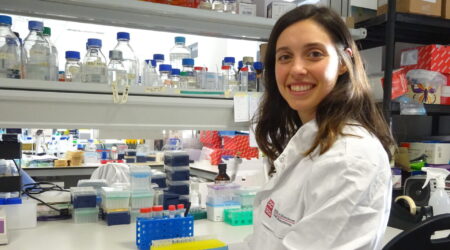Researchers: Dr Giulia Biffi & Professor Richard Gilbertson
Location: University of Cambridge
Date: April 2025
Project Status: Ongoing
Exploring how tumour cells communicate with their environment to identify new treatments for pancreatic cancer
The challenge
In a normal pancreas, cells called fibroblasts play a key role in maintaining tissue structure. However in a tumour, pancreatic cancer cells are able to reprogramme fibroblasts in their surrounding environment causing them to increase in number and support cancer growth and progression. Fibroblasts are also thought to play a role in resistance to treatment. For these reasons, fibroblasts are a promising target for new therapies for pancreatic cancer.
Cancer cells communicate with each other and with other types of cells through a process called cell signalling, which uses chemical messengers to relay messages between cells. Identifying which types of signals between cancer cells and fibroblasts are important for cancer growth, and which are irrelevent “chatter” has so far proved difficult. This makes it hard to know which signals would be good targets to disrupt in order to block tumour growth.
Studies from Dr Biffi and others have shown that similar groups of fibroblasts are present in both pancreatic cancer and lung cancer. The research team suspect that cancer cells and fibroblasts communicate in similar ways to advance disease even in different tumour types. By studying the cell signalling taking place in both pancreatic and lung tumours, they hope to identify the signals that are important for cancer progression and therefore would make the best targets for new treatments.
The project
In this project, the research team will study pancreatic cancer tumours, lung cancer tumours and pancreatic cancers that have spread to the lungs and use cutting-edge computer-modelling techniques to identify signals that play a key role in cancer progression in all three types of tumour. They will then identify those signals which involve fibroblasts, and test the effect of disrupting these signals in a mouse model of pancreatic cancer.
The hope
The research team hope to identify signals that have most potential as targets for developing new and more effective treatments for pancreatic cancer.
Computer modelling of primary and metastatic tumours could unmask key drivers of pancreatic cancer progression. This will guide the development of therapeutics for the benefit of metastatic pancreatic patients.



